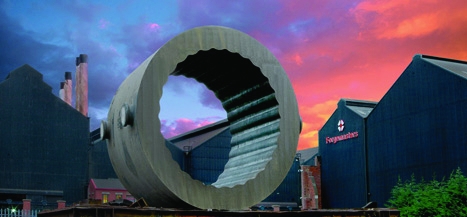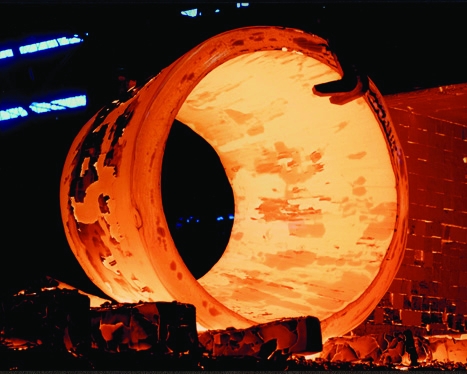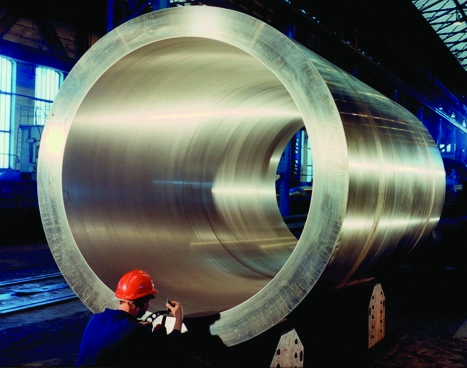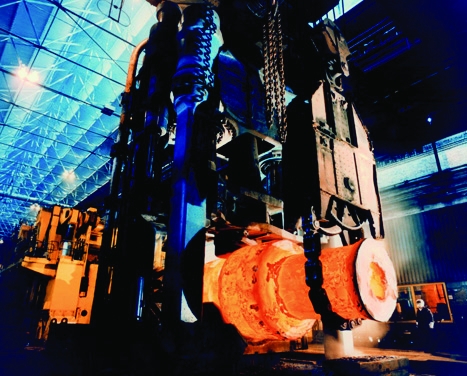
Last month’s announcement that Sheffield Forgemasters had secured £80m of government funding to buy and install a 15,000-tonne forging press was rightly seen as a coup for UK manufacturing.
As well as helping to secure hundreds of jobs, this large device – one of a handful around the world – could propel the UK to the summit of the global nuclear supply chain. Currently, the only manufacturer able to produce all of the large components required for the next generation of nuclear reactors is Japan Steelworks.
The device will use a giant set of jaws to apply pressure to huge chunks of steel that have been heated to around 1,200°C – shaping the components and improving their strength characteristics by aligning the molecular structure. According to Neil Maskrey, chief financial officer of the Yorkshire company, the extremely high integrity of the forgings produced this way makes them suitable for the exacting safety requirements of the nuclear industry. It is an intriguing reminder that the UK’s heritage of heavy engineering and emerging areas of technology are not mutually exclusive.
Maskrey hopes to award contracts to build the press later this summer. German companies SMS Meer and Siempelkamp and Japan’s Mitsubishi are all said to be in the running. Construction would begin immediately afterwards and the facility should be fully operational towards the latter half of 2013. Intriguingly, some of the big structural components for the press will be manufactured on the company’s largest existing 10,000-tonne press. ’There are quite large pieces of steel that form the infrastructure of the press itself, so we will be manufacturing the castings and forgings here internally for our own press,’ said Maskrey.
Although design details are currently under wraps, a Forgemasters spokesman confirmed that the device will be a ’pull-down’ press.
The company’s largest existing press is a 10,000-tonne ’push-down’ press. This means that most of the equipment, driving gear and weight of the device is above the ground. Around 300 tonnes of the equipment is behind the press itself and helps to move the jaws down.
One of the drawbacks of this approach is that all this weight above the press can make it slightly less stable in use. The benefit of a pull-down press is that most of the heavy-weighted gear is underground. What’s more, the hydraulic rams at the heart of the new press will be driven by oil rather than water and installing the driving gear beneath the ground helps improve the safety of the system in the event of a leak.

Expanding on the potential of the new device, Maskrey explained that the press will enable Forgemasters to exploit a huge global opportunity. ’There’s a critical supply and demand imbalance in relation to the production capacity for these ultra-large forgings required for the latest designs of nuclear power station new-build,’ he said. The world’s capability to make large and ultra-large forgings for the nuclear industry is currently restricted to the equivalent of five to seven reactor supply systems a year. Between 2011 and 2030, around 13 new reactors will be built globally each year. ’We would be doing two to three – it’s a fantastic market opportunity,’ added Maskrey.
He claimed that, while the company is currently able to manufacture around 40 per cent of the components required for a nuclear reactor on its 10,000-tonne press, the 15,000-tonne press will put the company at the peak of the global supply chain for civil nuclear manufacturing and could potentially be used to manufacture all of the critical structural components.
However, this doesn’t necessarily mean that the press would be used to build the components for the UK’s new fleet of reactors. Two reactor types are being proposed for the UK: the Westinghouse AP1000 and Areva’s EPR. So far, neither has been approved – and a final decision is not expected until the summer. However, should Areva win the lion’s share of the UK’s new-build contracts, the new press is unlikely to play much of a role. This is because one of the key backers of the Forgemasters project is Westinghouse. ’The 15,000-tonne press would be aligned significantly with Westinghouse, bordering towards exclusivity, but we would have the ability to supply components for Areva from our existing equipment,’ said Maskrey.

Even if Areva were to win the contracts for all of the UK’s new reactors, the business case for the 15,000-tonne press would not be weakened. ’It’s not just about the UK,’ he added. ’It’s a global opportunity. Obviously, we want to play a part in the UK. We’d be extremely proud to have our forgings in the UK power plants, but Westinghouse’s reach is global and we want to be a part of that. You’re looking at eight to 12 stations in the UK and 300 to 400 globally – the UK is just a drop in the ocean in that regard.’
While the new press will spend much of its time producing components for the growing nuclear industry, this will not be its only application. As well as building reactor components for the civil and defence industries, Maskrey said that the facility will also supply heavily into the offshore oil and gas and iron and steel industries.
Given that there is an election around the corner and the £80m government loan is not yet in Forgemasters’ coffers, it might be reasonable to expect a little nervousness on Maskrey’s part, but with new nuclear build one of the few areas that Labour and the Conservatives agree on, the prospect of a new government pulling the plug on the press is, he said, highly unlikely. ’Our firm belief is that our funding is earmarked, ring-fenced and will weather an election – like Labour, the Conservatives recognise that nuclear as a vehicle to fix the UK’s energy problems is an extremely viable solution,’ added Maskrey.

From the archive
In August 1856, The Engineer gave an account of Bessemer’s steel process
Mr H Bessemer read this paper at the British Association last Monday.
The manufacture of iron in this country has attained such an important position that any improvement in this branch of our national industry cannot fail to be a source of general interest and will, I trust, be a sufficient excuse for the present brief and, I fear, imperfect paper. For the last two years, my attention has been almost exclusively directed to the manufacture of malleable iron and steel, in which, however, I had made but little progress until within the last eight or nine months…
The numerous observations I had made during this very unpromising period all tended to confirm an entirely new view of the subject, which, at that time, forced itself on my attention, viz – that I could produce a much more intense heat without any furnace or fuel than could be obtained by either of the modifications I had used.



Nanogenerator consumes CO2 to generate electricity
Nice to see my my views being backed up by no less a figure than Sabine Hossenfelder https://youtu.be/QoJzs4fA4fo